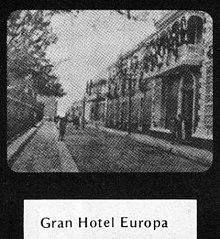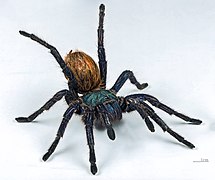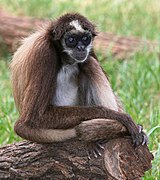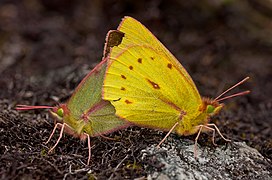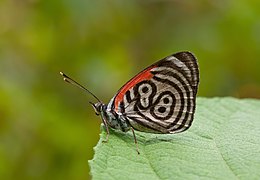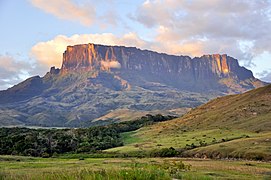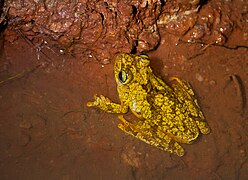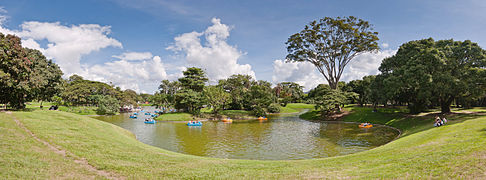Portal:Venezuela
The Venezuela Portal Venezuela, officially the Bolivarian Republic of Venezuela, is a country on the northern coast of South America, consisting of a continental landmass and many islands and islets in the Caribbean Sea. It comprises an area of 916,445 km2 (353,841 sq mi), and its population was estimated at 29 million in 2022. The capital and largest urban agglomeration is the city of Caracas. The continental territory is bordered on the north by the Caribbean Sea and the Atlantic Ocean, on the west by Colombia, Brazil on the south, Trinidad and Tobago to the north-east and on the east by Guyana. Venezuela is a presidential republic consisting of 23 states, the Capital District and federal dependencies covering Venezuela's offshore islands. Venezuela is among the most urbanized countries in Latin America; the vast majority of Venezuelans live in the cities of the north and in the capital. The territory of Venezuela was colonized by Spain in 1522 amid resistance from Indigenous peoples. In 1811, it became one of the first Spanish-American territories to declare independence from the Spanish and to form part of the first federal Republic of Colombia (Gran Colombia). It separated as a full sovereign country in 1830. During the 19th century, Venezuela suffered political turmoil and autocracy, remaining dominated by regional military dictators until the mid-20th century. From 1958, the country had a series of democratic governments, as an exception where most of the region was ruled by military dictatorships, and the period was characterized by economic prosperity. The 2024 presidential election were not recognized by the Carter Center and Organization of American States due to the lack of granular results, and disputed by the opposition, leading to protests across the country. (Full article...) Selected article -Un célebre especialista sacando muelas en el gran Hotel Europa (English: A celebrated specialist pulling teeth at the grand Hotel Europa) was the first Venezuelan film. It was screened at the Baralt Theatre in Maracaibo, Zulia on 28 January 1897 as the second in a film block of four; the block also featured another film from Maracaibo (Muchachos bañándose en la laguna de Maracaibo: English: Children bathing at the lagoon of Maracaibo). Little is known about the film's production, and scholars are uncertain of the identity of its director. No complete copies of the original film survive. During the 2010s, a reconstruction of the film was produced in Venezuela with preserved photographs from the original. In the film, a dental surgeon at the Hotel Europa in Maracaibo pulls a man's teeth. Although the subject matter could make it an early horror film, scholars agree that the film was an actuality film. (Full article...) Selected picture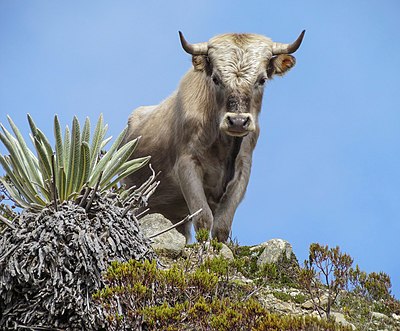
This is a feral Charolais cattle in the Venezuelan Sierra Nevada. The Charolais is a French breed of taurine beef cattle. It originates in, and is named for, the Charolais area of eastern France. Charolais are raised for meat; they may be crossed with other breeds, including Angus and Hereford cattle.
Selected biography -Pablo Emilio Sandoval Reyes (born August 11, 1986) is a Venezuelan-American professional baseball third baseman for the Staten Island FerryHawks of the Atlantic League of Professional Baseball. He has previously played in Major League Baseball (MLB) for the San Francisco Giants, Boston Red Sox and Atlanta Braves. He stands 5 feet 10 inches (1.78 m) tall, and weighs 268 pounds (122 kg). Nicknamed "Kung Fu Panda", Sandoval is a two-time All-Star and has won three World Series championships with the Giants. He hit three home runs in Game 1 of the 2012 World Series, becoming the fourth player to hit three home runs in a World Series game, leading to his being named that year's World Series Most Valuable Player (MVP). During the offseason, Sandoval plays for the Navegantes del Magallanes of the Venezuelan Professional Baseball League (VPBL). In 2002, Sandoval was signed by the San Francisco Giants. Sandoval worked his way through the minor leagues and debuted with the Giants in 2008, batting .345 in 41 games. Capable of playing first base, third base, and catcher, he became the Giants' starting third baseman in 2009, ceasing to catch that year and playing first base only occasionally. In 2009, Sandoval finished second in All-Star Final Vote balloting, batting .330 with 25 home runs and 90 runs batted in (RBIs) in his first full season in the majors. However, Sandoval struggled in 2010 and was benched during the playoffs for the 2010 World Series, which the Giants won. He lost weight before 2011 and hit .315 with 23 home runs in 117 games. Injuries limited Sandoval to 109 games in 2012, but he was selected to his second-straight All-Star Game. Then, in Game 1 of the 2012 World Series, Sandoval joined Babe Ruth, Reggie Jackson, and Albert Pujols as the only players to hit three home runs in a World Series Game. For his contributions, Sandoval was named the World Series Most Valuable Player, as the Giants swept the Detroit Tigers. In 2013, he appeared in 141 games, batting .278, with 14 home runs, and 79 RBIs. (Full article...) In this month...
Did you know (auto-generated) -
Selected list -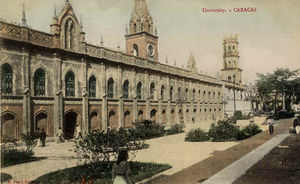 Venezuela has a wide array of universities, offering courses in a broad variety of subjects, spread between a total 23 public and 24 private universities located across several states. As a result of a Royal Decree signed by Philip V of Spain, the Central University of Venezuela—the country's oldest—was founded in 1721 as "Universidad Real y Pontificia de Caracas". The campus was originally at the now-known "Palacio de las Academias" but, in 1944, president Isaías Medina Angarita relocated it to the University City of Caracas. The second oldest university is the University of the Andes. Established in 1810 as the "Real Universidad de San Buenaventura de Mérida de los Caballeros", its origins date back to 1785 when Fray Juan Ramos de Lora founded a priest school in the city of Mérida. The University of Zulia—the third-oldest university—was founded in 1891 when the Federal College of Maracaibo was converted into a university. The government ordered the closure of the university for political reasons in 1904, and it remained closed until 1946. The University of Carabobo is the last to be founded before the twentieth century by being established in 1892 and dating back to 1833 when the College of Carabobo was created by presidential decree. (Full article...) Current events
More did you know...
TopicsCategoriesRecognized content
Featured articlesGood articles
Featured pictures
New articlesThis list was generated from these rules. Questions and feedback are always welcome! The search is being run daily with the most recent ~14 days of results. Note: Some articles may not be relevant to this project.
Rules | Match log | Results page (for watching) | Last updated: 2024-12-31 22:43 (UTC) Note: The list display can now be customized by each user. See List display personalization for details.
Things you can doWikiProjects
Related portalsAssociated WikimediaThe following Wikimedia Foundation sister projects provide more on this subject:
Discover Wikipedia using portals
|

